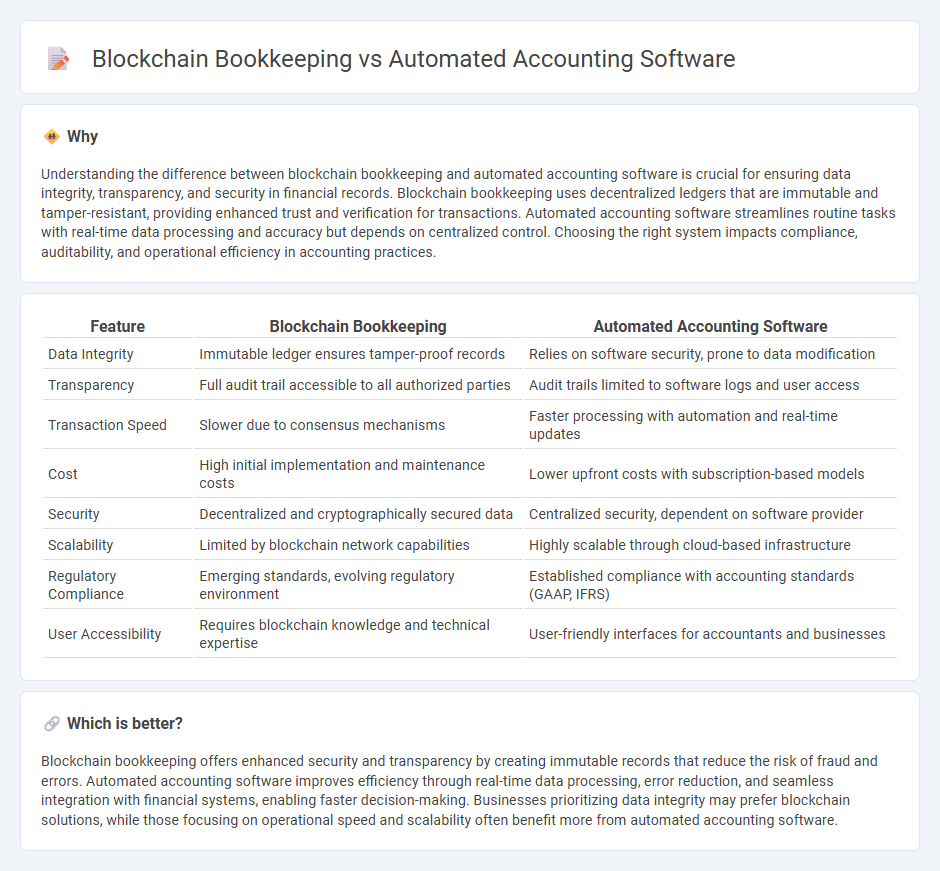
Blockchain bookkeeping ensures transparency and immutability by recording every transaction on a decentralized ledger, reducing fraud and errors in financial records. Automated accounting software streamlines processes using AI and machine learning, enhancing speed and accuracy in data entry, reconciliation, and reporting. Explore the differences between these innovative accounting technologies to understand which solution fits your business needs best.
Why it is important
Understanding the difference between blockchain bookkeeping and automated accounting software is crucial for ensuring data integrity, transparency, and security in financial records. Blockchain bookkeeping uses decentralized ledgers that are immutable and tamper-resistant, providing enhanced trust and verification for transactions. Automated accounting software streamlines routine tasks with real-time data processing and accuracy but depends on centralized control. Choosing the right system impacts compliance, auditability, and operational efficiency in accounting practices.
Comparison Table
| Feature | Blockchain Bookkeeping | Automated Accounting Software |
|---|---|---|
| Data Integrity | Immutable ledger ensures tamper-proof records | Relies on software security, prone to data modification |
| Transparency | Full audit trail accessible to all authorized parties | Audit trails limited to software logs and user access |
| Transaction Speed | Slower due to consensus mechanisms | Faster processing with automation and real-time updates |
| Cost | High initial implementation and maintenance costs | Lower upfront costs with subscription-based models |
| Security | Decentralized and cryptographically secured data | Centralized security, dependent on software provider |
| Scalability | Limited by blockchain network capabilities | Highly scalable through cloud-based infrastructure |
| Regulatory Compliance | Emerging standards, evolving regulatory environment | Established compliance with accounting standards (GAAP, IFRS) |
| User Accessibility | Requires blockchain knowledge and technical expertise | User-friendly interfaces for accountants and businesses |
Which is better?
Blockchain bookkeeping offers enhanced security and transparency by creating immutable records that reduce the risk of fraud and errors. Automated accounting software improves efficiency through real-time data processing, error reduction, and seamless integration with financial systems, enabling faster decision-making. Businesses prioritizing data integrity may prefer blockchain solutions, while those focusing on operational speed and scalability often benefit more from automated accounting software.
Connection
Blockchain bookkeeping enhances transparency and security in accounting by providing an immutable ledger, while automated accounting software streamlines data processing and real-time financial reporting. Integration of these technologies reduces errors, fraud risks, and reconciliation time by enabling synchronized, tamper-proof records accessible across decentralized platforms. Together, they optimize accuracy and efficiency in financial management, supporting compliance and audit readiness.
Key Terms
Data Integrity
Automated accounting software streamlines financial data management using algorithms to minimize human error, yet it remains vulnerable to centralized data manipulation and cyber threats. Blockchain bookkeeping offers enhanced data integrity through decentralized, immutable ledgers that ensure transparent and tamper-proof transaction records across a distributed network. Discover how integrating blockchain technology can revolutionize financial accuracy and security in your accounting processes.
Real-time Processing
Automated accounting software enables real-time processing by instantly recording financial transactions through integrated AI and cloud-based systems, enhancing accuracy and reducing manual errors. Blockchain bookkeeping offers real-time transparency and immutable ledger updates across decentralized networks, ensuring trustworthiness and auditability in financial records. Explore the comparative benefits and use cases of these technologies to optimize your financial management strategies.
Decentralization
Automated accounting software typically operates on centralized databases managed by a single entity, offering streamlined transaction processing and real-time financial reporting but exposing data to potential manipulation and single points of failure. In contrast, blockchain bookkeeping utilizes decentralized ledgers distributed across multiple nodes, ensuring transparency, immutability, and enhanced security through consensus mechanisms and cryptographic validation. Explore the transformative impact of decentralization on financial record-keeping and the future of accounting technology.
Source and External Links
Trullion: AI-Powered Accounting Software Solutions - Trullion is an AI-powered platform that automates financial workflows such as lease accounting, revenue recognition, and audit readiness using agentic AI designed specifically for accounting teams, enabling accurate, compliant, and streamlined processes.
10 smart accounting automation software systems to try - Spendesk - Popular automated accounting software includes Xero, favored by small businesses for its user-friendly interface and comprehensive features, and QuickBooks, serving as a default choice for automation across many firms.
Best accounting automation software for workflow automation - Brex - Brex uses AI to automate GL coding, expense mapping, anomaly detection, and multi-entity management, allowing accounting teams to reduce busywork, increase accuracy, and integrate seamlessly with major ERPs like NetSuite and QuickBooks.
 dowidth.com
dowidth.com